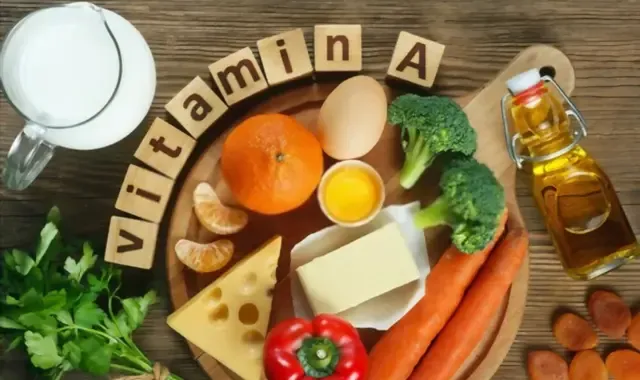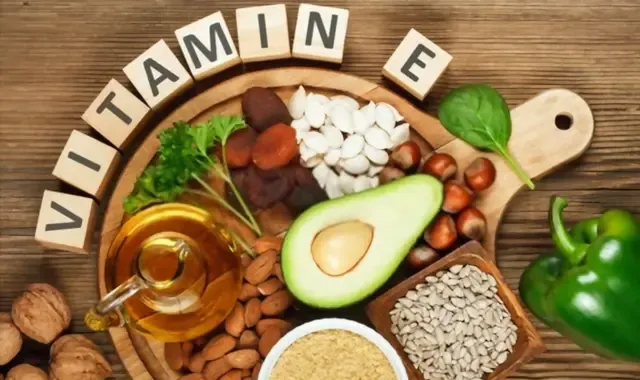Vitamins
We've been told throughout our lives to eat certain foods because they contain vitamins, and so the obvious question is, well what are vitamins?.
There are a lot of things your body needs that your body is capable of producing, but there are certain things that it needs that it cannot produce itself.
Now if these things that the body needs and cannot produce if they are organic is just a very fancy way of saying if there are compounds that involve carbons in them, and most molecules in life involve a lot of carbons, that's why they're called organic molecules.
If these molecules these things that the body requires that it does not produce, are organic, we call these things vitamins.
There are some of the common vitamins that you'll hear people talk about are things like vitamin A, vitamin D, vitamin E, vitamin K, and vitamin C.
Vitamins are Organic compounds that the human body is unable to synthesize (except a few) and have to be taken in with Food. Vitamins are produced in Plants using the Sun.
Vitamins are essential to the human body, they enable the growth, development, and functioning of our body.
You can further divide these vitamins based on whether they are soluble in fat or not.
So, for example, Vitamins A, D, E, and K, and this is by no means an exhaustive list of vitamins, these are fat soluble.
What does that mean?.
Well, to be soluble means you could be dissolved in that thing.
So it can be dissolved in fat.
The Vitamin (B1, B2, B3, B5, B6, B7, B9, B12, C) are water-soluble.
Water-soluble Vitamins are excreted from the body after a few hours.
Oil-soluble Vitamins are accumulated in the liver.
The Best Vitamins
Fresh foods have more vitamins than canned food. Wild vegetables and Forest Fruits are richer in vitamins than Cultivated Plants.
In our diet, we should use as much as possible natural sources of vitamins: Fruits, Vegetables, Eggs, Milk, etc.
This means that they are the Best Vitamins that are taken through Fresh Food.
Types of vitamins and their benefits
Vitamin A
Vitamin A is important for the prevention of heart, skin, and degenerative diseases, it protects the body from infections and is important for normal blood sugar levels.
The main sources of vitamin A are usually liver, milk and milk products, butter, egg yolk, and fish.
Vitamin E
Vitamin E is a powerful antioxidant, it protects cells from free radicals and prevents Cancer and Cardiovascular Disease.
Vitamin D
The vitamin D group consists of 7 vitamins.
Daily requirements for vitamin D are very small. We get it through sunlight and food.
The Natural Sources of Vitamin D are: butter, margarine, milk, seafood (salmon, tuna, sardines), fish oil (It has the highest concentration of Vitamin D), egg yolk, etc.
Vitamin D3 is produced in our body in the skin through sunlight, and it may also be found in foods of animal origin.
Vitamin C
Vitamin C is a strong Antioxidant, also an excellent ingredient to boost immunity as well as the detoxification of the body, it prevents the occurrence of flu and colds.
It is great for healthy hair, skin, and nails.
Foods that contain large amounts of vitamin A are: oranges, strawberries, peppers, broccoli, green leafy vegetables, kiwi, cabbage, grapefruit, etc.
Vitamin B12
The best sources of vitamin B12 are fish and eggs.
Vitamin B12 is important for the nervous system (improves memory and concentration). It prevents anemia and menstrual problems, and it is important for the normal growth and development of children.
Vitamins are nutrients, in addition to Carbohydrates, Fats, Proteins, Minerals, and Water.
The lack of vitamins causes metabolic disorders and disrupts the normal regeneration of the body.
Now, the reason why this might be relevant for your living as an individual, trying to keep your health
in good shape, is that you do need all of these vitamins, and we'll talk in a little about why you need
them, but fat-soluble vitamins, they're actually easier to overdose on, because they're soluble in fat, they can stay in your system a lot longer, while water-soluble vitamins are easier to flush out of your system.
FAQs
Q: What are vitamins?
Vitamins are organic compounds that the human body is unable to synthesize (except a few) and have to be taken in with food.
Q: What are some common vitamins?
Some common vitamins are vitamin A, vitamin D, vitamin E, vitamin K, and vitamin C.
Q: What is the difference between fat-soluble and water-soluble vitamins?
Fat-soluble vitamins can dissolve in fat and are stored in the liver, while water-soluble vitamins are excreted from the body after a few hours.
Q: What are the best sources of vitamins?
Fresh foods, especially fruits, vegetables, eggs, and milk, are the best sources of vitamins.
Q: What are the benefits of vitamin A, vitamin E, vitamin D, vitamin C, and vitamin B12?
Vitamin A is important for the prevention of heart, skin, and degenerative diseases, vitamin E is a powerful antioxidant that protects cells from free radicals and prevents cancer and cardiovascular disease, vitamin D is important for bone health and the nervous system, vitamin C is a strong antioxidant that boosts immunity and is great for healthy hair, skin, and nails, and vitamin B12 is important for the nervous system, prevents anemia and menstrual problems, and is important for the normal growth and development of children.
Q: Can you overdose on fat-soluble vitamins?
Yes, it is easier to overdose on fat-soluble vitamins because they can stay in your system longer than water-soluble vitamins.






